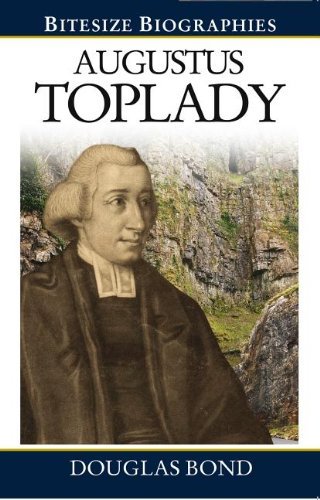Reviewed by Casey G. McCall
Typed in very small print at the bottom of hymnals and in the copyright section of PowerPoint slides, you may come across the name Augustus Toplady. I was familiar with the name and with one of Toplady’s most famous hymns, “Rock of Ages,” but I knew very little about the life of the author before reading this captivating little biography by Douglas Bond.
Before delving into Bond’s brief treatment of Toplady’s life, let me commend this entire series to anyone who is interested in church history. It took me parts of two days to read this book, and all of the other books in the series are of similar length. The church desperately needs to be aware of its history, but many would-be readers are frightened off by the intimidating length of many of the biographies available today. Series of books like “Bitesize Biographies” fill this void by introducing readers to fascinating figures from history in small doses, leaving the reader to decide if further research is warranted.
Toplady’s life was anything but typical. Bond points out that Toplady, an ordained pastor, never married and had no children. He also died at the young age of 38. So what made this short life so memorable? Three things stand out.
First, Toplady never got over God’s grace toward him in Jesus Christ. From his conversion as a teenager until the end of his life over twenty years later, Bond shares diary entry after diary entry detailing a man amazed and at times overwhelmed by God’s love. Like his contemporary and fellow Anglican John Newton, Toplady longed for tangible experiences of God’s love. He wanted to feel in his heart the warmth of gospel grace: “The sensible effusion of divine love in the soul, is superior to, independent of, and distinct from, bodily health, strength, and spirits” (115).
Second, Toplady lived by his convictions. In a day and age when the Anglican church was known for spiritual lethargy, Toplady remained in the established church, not for convenience, but because “he subscribed the [Anglican] articles and liturgy from principle” (40). Toplady’s convictions also led him into a very nasty public controversy with John Wesley over the doctrine of predestination. Bond is fair in criticizing Toplady’s tone during this debate (91), but Wesley comes out looking much worse. Toplady would have been the first to admit that he was a sinner and likely sinned in his debate with Wesley, but his zeal for God’s truth is nevertheless evident.
Third, Toplady left the church with a rich storehouse of gospel hymnody. “Rock of Ages” is certainly the most recognized, but contemporary versions of “A Debtor to Mercy Alone” show that there are other buried treasures from Toplady’s heart and pen yet to receive acclaim.
In conclusion, Bond’s book successfully showcases a worthy Christian life that warrants attention and even imitation. The size of the book should not intimidate any reader. If you, like me, are interested in the stories behind the hymns, this book presents a great place to begin.
Casey G. McCall
Lead Pastor at Ashland Oldham County
PhD Student – MBTS
